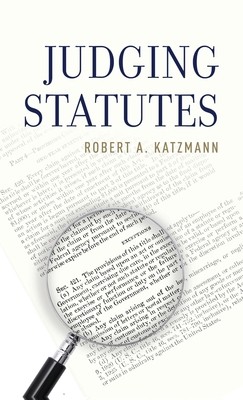
- We will send in 10–14 business days.
- Author: Robert A Katzmann
- Publisher: Oxford University Press, USA
- ISBN-10: 0199362130
- ISBN-13: 9780199362134
- Format: 14.7 x 21.1 x 1.8 cm, hardcover
- Language: English
- SAVE -10% with code: EXTRA
Reviews
Description
In an ideal world, the laws of Congress--known as federal statutes--would always be clearly worded and easily understood by the judges tasked with interpreting them. But many laws feature ambiguous or even contradictory wording. How, then, should judges divine their meaning? Should they stick only to the text? To what degree, if any, should they consult aids beyond the statutes themselves? Are the purposes of lawmakers in writing law relevant?
Some judges, such as Supreme Court Justice Antonin Scalia, believe courts should look to the language of the statute and virtually nothing else. Chief Judge Robert A. Katzmann of the U.S. Court of Appeals for the Second Circuit respectfully disagrees. In Judging Statutes, Katzmann, who is a trained political scientist as well as a judge, argues that our constitutional system charges Congress with enacting laws; therefore, how Congress makes its purposes known through both the laws themselves and reliable accompanying materials should be respected. He looks at how the American government works, including how laws come to be and how various agencies construe legislation. He then explains the judicial process of interpreting and applying these laws through the demonstration of two interpretative approaches, purposivism (focusing on the purpose of a law) and textualism (focusing solely on the text of the written law). Katzmann draws from his experience to show how this process plays out inthe real world, and concludes with some suggestions to promote understanding between the courts and Congress. When courts interpret the laws of Congress, they should be mindful of how Congress actually functions, how lawmakers signal the meaning of statutes, and what those legislators expect of courts construing their laws. The legislative record behind a law is in truth part of its foundation, and therefore merits consideration.
EXTRA 10 % discount with code: EXTRA
The promotion ends in 18d.10:42:43
The discount code is valid when purchasing from 10 €. Discounts do not stack.
- Author: Robert A Katzmann
- Publisher: Oxford University Press, USA
- ISBN-10: 0199362130
- ISBN-13: 9780199362134
- Format: 14.7 x 21.1 x 1.8 cm, hardcover
- Language: English English
In an ideal world, the laws of Congress--known as federal statutes--would always be clearly worded and easily understood by the judges tasked with interpreting them. But many laws feature ambiguous or even contradictory wording. How, then, should judges divine their meaning? Should they stick only to the text? To what degree, if any, should they consult aids beyond the statutes themselves? Are the purposes of lawmakers in writing law relevant?
Some judges, such as Supreme Court Justice Antonin Scalia, believe courts should look to the language of the statute and virtually nothing else. Chief Judge Robert A. Katzmann of the U.S. Court of Appeals for the Second Circuit respectfully disagrees. In Judging Statutes, Katzmann, who is a trained political scientist as well as a judge, argues that our constitutional system charges Congress with enacting laws; therefore, how Congress makes its purposes known through both the laws themselves and reliable accompanying materials should be respected. He looks at how the American government works, including how laws come to be and how various agencies construe legislation. He then explains the judicial process of interpreting and applying these laws through the demonstration of two interpretative approaches, purposivism (focusing on the purpose of a law) and textualism (focusing solely on the text of the written law). Katzmann draws from his experience to show how this process plays out inthe real world, and concludes with some suggestions to promote understanding between the courts and Congress. When courts interpret the laws of Congress, they should be mindful of how Congress actually functions, how lawmakers signal the meaning of statutes, and what those legislators expect of courts construing their laws. The legislative record behind a law is in truth part of its foundation, and therefore merits consideration.


Reviews